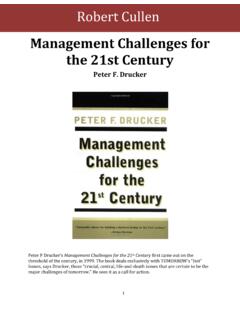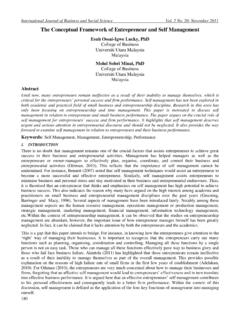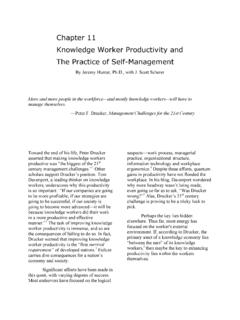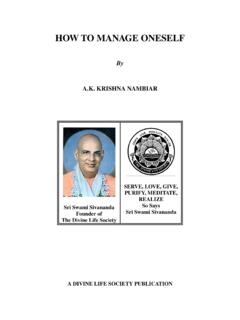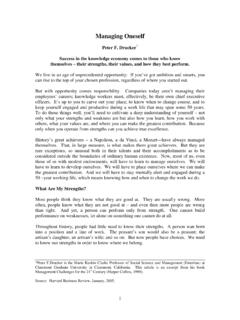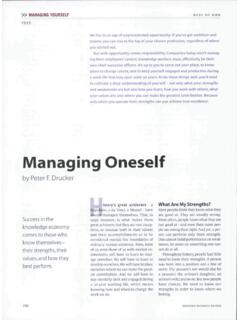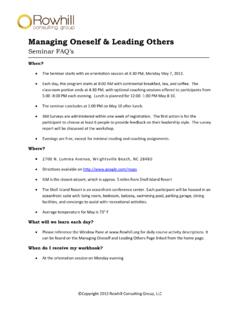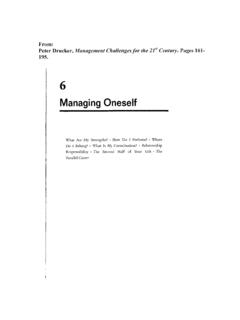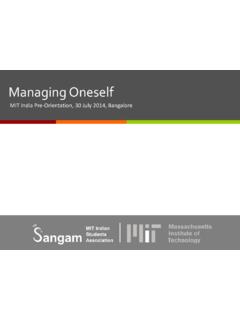Transcription of Peter F. Drucker - Law Leadership Innovation
1 1 managing oneself Peter F. Drucker In Management Challenges for the 21st Century, Peter F Drucker dedicates his concluding chapter to the new demands that will be placed on individuals in the workplace. (You can get a better idea of the book with the book summary: Management Challenges for the 21st Century. An article on the same theme was published in the Harvard Business Review in 2005. The message in both are the same, but the book offers better context. So the summary here is from the book chapter. Knowledge workers will have to manage themselves, says Drucker . They will have to place themselves where they can make the greatest contribution; they will have to learn to develop themselves. If that wasn t challenging enough, Drucker adds more requirements to the list. Knowledge workers of the 21st century .. will have to learn to stay young, and mentally alive during a fifty-year working life.)
2 They will have to learn how and when the change what they do, how they do it and when they do it. People are living longer. Today s worker bees are knowledge workers rather than manual workers. Most do not have the luxury of lifelong employment their grandparents, and some of their parents enjoyed. That means that we ll have to change our employment and even careers over our lengthy work life. Many of us have done that already. This also means learning new things as well as unlearning what we used to know. Realities of the workplace, how work is organized and how it is done, is changing too. More and more people are in part time jobs, and holding more than one job at a time. Others are working from home or working in teams that are spread across the globe. The traditional 9 to 5 job is not a reality for a lot of people. In such a context, when the onus of managing oneself becomes the key to productivity and performance, how will we fare?
3 We can prepare to meet these new demands by finding answers to a series of questions. What are my strengths? HOW do I work? Most people think they know what they are good at. They are usually wrong. What do we do then? In Drucker s view, we need the answers today because we have choices to make. It is only by knowing our strengths that we can know where we belong. Robert Cullen 2 Feedback analysis helps us find our strengths. Here s how this simple technique works: whenever you make a decision or take a key action, write down your expectation of what will happen. Drucker admits that he has been doing it for 15 to 20 years. And every time I do it I am surprised, he says. And so is everyone who has ever done this. Within two or three years of doing this, you will know your strengths probably the most important thing to know about oneself . It will show what you do or fail to do that deprives you of a full yield from your strengths.
4 It will show areas where you are not particularly competent and where you have no strengths. Once you know, you work on a number of action conclusions: Concentrate on your strengths. This means putting yourself where your strengths can produce results. Work on improving your strengths and fill gaps in one s knowledge. This enables you to fully realize your strengths. Overcome intellectual arrogance which causes disabling ignorance. Pride in ignorance is self defeating. Remedy bad habits that inhibit effectiveness and performance. For example, things like too much time planning and little time on execution or bad manners can impede performance. Learning what not to do. This means staying away from taking on work, jobs and assignments in areas where we have not talent and skill. Waste no time (or as little as possible) on improving areas of low competence.
5 Even in an organizational or teaching context, energy, resources and time should be spent on making competent people into star performers. Do not waste time trying to make incompetent performers into mediocre ones. On surface, there is conflict between the first two and the last two points. You should try to leverage your strengths especially when choosing work. But that does not mean you should let your weaknesses ruin your life. How do I perform? This is an equally important question, says Drucker . Feedback analysis will show you if there is something amiss in how you perform, but not its cause. Whether you are a reader or a listener and how you learn your preferred learning style play a role in how you perform. Whether you are a loner or work well with people, and in what contexts as team members, subordinates, or as coaches or mentors matters too. Do you work best as a decision maker or as adviser?
6 All these make a difference to how you perform. Once you have an understanding of how you perform, here s Drucker s advice: Do not try to change yourself you are unlikely to succeed. Work to improve the way you perform. Pick work consistent with your values, especially when there are conflicts between strengths and values. Drucker explains how he was performing extremely well as a young investment banker in London in the mid-1930s, but while it clearly fitted his strengths, he did not see himself making a contribution as an asset manager because he realized people 3 were his values. I saw no point in being the richest man in the cemetery. I had no money, no job in a deep Depression and no prospects. But I quit and it was the right thing. Values are and should be the ultimate test , he says. Where do I belong? Knowing your strengths, how you perform and what your values are enables you to decide where you belong.
7 However, Drucker cautions that this is not a decision that most people can or should make at the beginning of their careers . While a minority of people will know very early whether they will become mathematicians, musicians or cooks, he says that most people, and especially highly gifted people, do not really know where they belong till they are well past their mid-twenties. However, by the time a person reaches this age, they should know their strengths, how they perform and what their values are, which would help them decide where they belong. It is equally important to know where you do not belong. Successful careers are not planned , says Drucker . They are the careers of people who are prepared for the opportunity because they know their strengths, the way they work and their values. For knowing where one belongs makes ordinary people hardworking, competent but mediocre otherwise into outstanding performers.
8 What is my contribution? This calls for moving from knowledge to action. But, it isn t about what you want to contribute or what you are told to contribute. It is about what you should contribute. As knowledge workers, we will have to learn to ask What should my contribution be? . And then only ask whether it fits our strengths, whether it is what we want to do and whether we find it stimulating. What should my contribution be? needs to balance three things: What does the situation require? How could I make the greatest contribution (in the context of strengths, way of performing and values)? What results must be achieved to make a difference? Knowing what you should contribute, naturally gives you both freedom to decide and responsibility to act upon it. Relationship responsibility Most people work with others and are effective through others. This is why relationship responsibility is part of managing oneself .
9 There are two aspects to this. To be effective we need to understand the strengths of others, how they work and what their values are. Beyond understanding their values and strengths, we need to understand whether our bosses, subordinates and team members are readers or listeners. How best do they learn is it by hearing, reading, writing up, or doing things hands on? How we receive and give instructions and feedback, how we organize and carry on our work, how we report our performance or evaluate others performance will have an impact on both our performance and theirs. If we cannot modulate ourselves to work well with others, fitting our modes of working with theirs in a compatible manner we are setting everyone up for poor performance. 4 Taking responsibility for communications is the second thing we need to do to manage ourselves effectively. Once we figure out our strengths, values, how we perform and what our contribution should be, naturally we need to communicate this.
10 Who needs to know this? On whom do I depend? And who depends on me? Once everyone on that list knows about us, and we know about them in this manner, working together will become much easier. We would not fall into the trap that Lyndon B Johnson fell into, not knowing he was a listener. When John Kennedy was President, he always got his assistants to put everything in writing, and read them first, before discussing anything. Kennedy was a reader and knew it. When Johnson succeeded to Presidency, he kept those brilliant writers on his staff and they continued to write. According to Drucker , Lyndon Johnson destroyed his Presidency in large measure, by not knowing that was a listener. There are many other interesting examples from politics and business in Drucker s book. The second half of your life Preparing for the second half of one s life is a key aspect of managing oneself .
